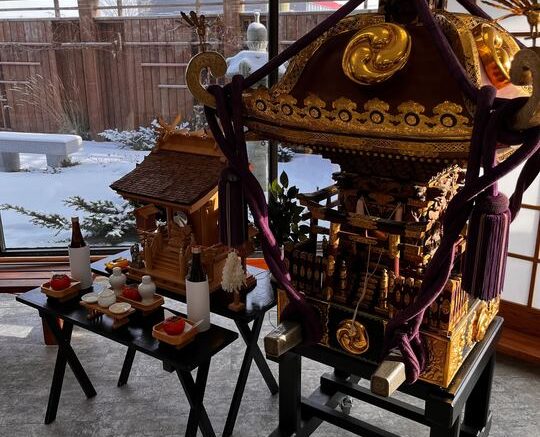After a prolonged break due to COVID-19, the Japanese Cultural Association of Manitoba (JCAM) hosted the Japanese New Year celebration, Oshogatsu, at the Manitoba Japanese Canadian Cultural Centre on Jan. 7.
I attended the celebration this past weekend, and while I have always celebrated the new year with my family in our own way, this was my first time celebrating the traditional holiday with my community.
Upon entering the centre, I watched volunteers greeting and welcoming guests. The foyer swelled with voices speaking in both English and Japanese while community members and families mingled together as we all waited for the events to begin.
The opening speech was given by association president Dr. Kelly Kaita. He discussed the traditions such as hatsumode, first shrine visits, where people visit a shrine to pray for good luck, mochitsuki, the process of pounding rice with wooden mallets and Osechi, traditional dishes eaten in the hopes of good health for oneself and family.
There was a small display of a shrine set up beside the centre’s Mikoshi, where people could make a prayer for the new year.
After the speech, people lined up to buy a delicious lunch prepared by volunteers and renowned local sushi chef Sadao Ohno. I joined the line and bought a full lunch consisting of ozoni, barazushi, inari, karaage, pan-fried yakitori and zenzai for dessert.
Community, family and friends all sat together as we ate and laughed about the past year and days to come.
I savoured each bite of both discussion and food. My favourite dishes were ozoni, barazushi, and zenzai. The ozoni and zenzai both contained homemade mochi that I wish I could eat every day. The chewiness of the mochi, a type of rice cake, alongside the umami broth and anko, sweet red beans, warmed my soul as the events started.
An usu, a stone mortar, was brought out and mochitsuki began, a New Year’s tradition of pounding rice to make mochi. Kids and adults alike lined up to take turns to use the mallets, pounding and flipping the rice.
I have been told about my family making mochi together for New Year’s in the past, but it’s not something we do anymore. While I did not take a turn making the mochi, watching people go from hesitantly lining up to rushing forward for an opportunity to participate brought me feelings of incredible joy and a sense of healing.
The afternoon ended with musical entertainment from different musicians who played the koto, shakuhachi and shamisen instruments, and finally, taiko performed by Hinode Taiko, a taiko ensemble based in Winnipeg.
The opportunity to witness and hear the music from and by my community instilled an overwhelming promise of hope in me.
While sometimes it feels near impossible to reconnect with and reclaim my cultural roots in Winnipeg, it is at events such as Oshogatsu where re-rooting myself feels entirely possible and tangible through sharing culture and community.
JCAM hosts other events throughout the year and each is full of care and love for not only the events, but for one another. I recommend anyone to attend if you would like to be surrounded by delicious food and beautiful music, both traditional, and a mix of culture and a loving community.



